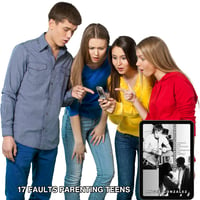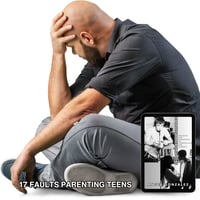#Parenting How Negative Role Models influence Teens-Parents Relationships?
 The teenage years are a time of self-discovery and exploration, during which young people are highly impressionable and seeking guidance. In this critical phase, the concept of role models becomes profoundly influential.
The teenage years are a time of self-discovery and exploration, during which young people are highly impressionable and seeking guidance. In this critical phase, the concept of role models becomes profoundly influential.
While positive role models can inspire and motivate teenagers to achieve their best, negative role models can lead them astray. Understanding the impact of these negative influences is crucial for parents to protect and guide their children effectively.
The Attraction of Negative Role Models
Adolescents often look outside their parental sphere for role models, drawn by figures who are perceived as successful, rebellious, or unconventional. Negative role models can include celebrities, peers, or even fictional characters who engage in questionable or destructive behaviours. These individuals may glamorize risky behaviours, such as substance abuse, aggression, or disregard for authority, creating a distorted perception of success and fulfilment.
Teenagers are naturally inclined to test boundaries and challenge norms. As a result, they may find themselves attracted to negative role models who embody traits they see as adventurous or daring. Unfortunately, this attraction can significantly impact their choices, attitudes, and behaviours.
Impact on Teen Behavior and Choices
Negative role models can profoundly affect a teenager's decision-making process. As teens seek to emulate these influences, they may adopt harmful behaviours that conflict with their values and responsibilities. Imitating negative behaviours can lead to various issues such as academic decline, substance abuse, and strained relationships with family and peers.
The attempt to mirror negative role models can also lead to identity confusion. Adolescents might struggle with self-esteem and self-worth as they pursue lifestyles that feel incongruent with their true selves. This identity crisis can exacerbate feelings of anxiety and depression, further distancing teens from positive influences.
Effects on the Parent-Teen Relationship
The influence of negative role models often creates tension and conflict within families. Parents who witness their teens adopting undesirable behaviours may struggle to connect and communicate effectively. The clash between parental guidance and a teen's desire to emulate a negative role model can lead to power struggles, defiance, and communication breakdowns.
Parents may feel frustrated and helpless, unsure how to reach their child or counteract the negative influence. In turn, teens may perceive their parents' concern as controlling or out of touch, leading them to withdraw further. This cycle of misunderstanding can erode trust and weaken the parent-teen bond.
Encouraging Positive Role Models
While the influence of negative role models is concerning, parents can take proactive steps to encourage positive influences in their teen's life. Open communication is key to understanding which individuals or characters your teen admires and discussing the reasons behind their choices.
Encouraging exposure to positive role models, whether through books, films, or real-life mentors, can provide teens with alternative perspectives. Highlighting the achievements and qualities of individuals who exemplify integrity, perseverance, and compassion helps teens appreciate the value of positive attributes.
Parents can also serve as role models by embodying the traits and behaviors they wish to instill in their children. Demonstrating authenticity, resilience, and empathy provides teens with a real-life example to emulate, reinforcing their understanding of healthy relationships and fulfilling life paths.
Rebuilding Trust and Communication
If the influence of negative role models has strained the parent-teen relationship, rebuilding trust is essential. Creating a safe space for open dialogue allows teens to express their thoughts and feelings without fear of judgment.
Parents should approach these conversations with empathy and active listening, striving to understand their teen's perspective and concerns. By validating their emotions and experiences, parents can bridge the gap and cultivate an environment of mutual respect and understanding.
.png?width=600&height=900&name=17%20Faults%20Parenting%20Leaders%20(6%20x%209%20in).png) Setting realistic boundaries that balance independence with guidance can help teens feel supported without feeling restricted. Collaborative discussions about rules and expectations promote accountability and encourage responsible decision-making.
Setting realistic boundaries that balance independence with guidance can help teens feel supported without feeling restricted. Collaborative discussions about rules and expectations promote accountability and encourage responsible decision-making.
Negative role models can wield a powerful influence over teenagers, shaping their attitudes and behaviours at a vulnerable time in their lives. However, parents can counteract these negative influences by fostering open communication, providing positive role models, and setting supportive boundaries.
By understanding the impact of negative role models and actively engaging with their teens, parents can guide them toward more constructive and rewarding paths. Strengthening the parent-teen relationship through empathy, communication, and trust empowers teenagers to navigate their development with confidence and integrity.
As families navigate this transformative phase together, they can create a foundation that encourages teens to seek inspiration from role models who exemplify positive qualities and who inspire them to achieve their fullest potential. Through this collaborative effort, parents and teens can embark on a journey of growth and connection, built on the pillars of understanding and respect.
Get 17 Faults Parenting Leaders Now.
Available on Amazon Click HERE
And Downloadable e-book Click HERE
.png?width=50&name=Untitled%20design%20(2).png)


